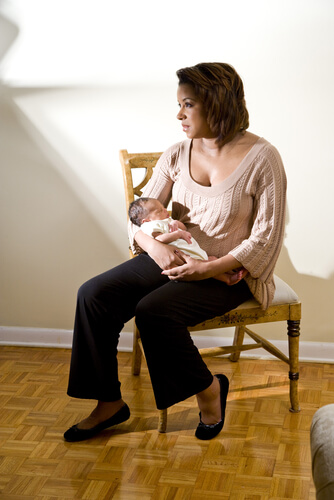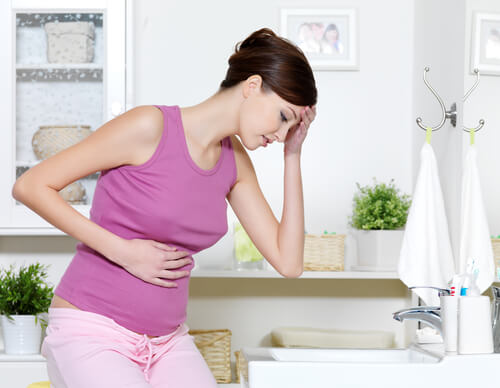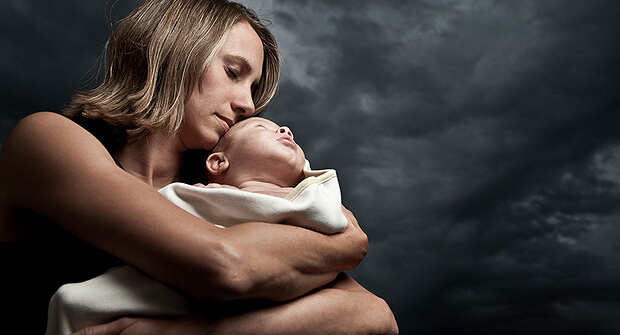The Delicate Moment Of Postpartum

The fourth trimester, the postpartum period, is one of the moments of greatest maternal vulnerability on all levels. During this stage, the baby and the mother are still a physical unit while the child becomes more and more independent.
As a natural consequence of this, the mother’s life is so conditioned to be complimentary, which can frustrate the routine or stability to which she aspires.
This is a moment of fright, of worries, of pleasure and connection that lead to a number of mixed feelings that may eventually become overwhelming.
Why does this happen? Because the first three months after childbirth constitute a period of enormous physical, emotional and psychological changes.
Let’s see below some of the discomforts or problems that may arise:
Body readjustment
For example, the body sweats a lot and the new mother has hot flashes, which is totally normal although not very well known. It is also common for hair to fall out due to hormonal changes, although it grows back naturally.
In the same way, the new mother may be bleeding for four or six weeks, time that the uterus takes to heal the place where the placenta was. This is very uncomfortable and some women may find it difficult to cope.

Postpartum sexuality
Another common problem faced by women who have just given birth is pain during sexual intercourse, especially those who have undergone episiotomy (an incision that goes from the vulva to the anus and that facilitates the baby’s exit from the womb).
However, regardless of whether episiotomy has occurred, the hormonal changes that occur during breastfeeding and the fatigue of sleepless nights can lead to a certain vaginal dryness.
In these moments of emotional ecstasy, it can be difficult to understand the reason why you do not enjoy or do not want to have sex. Thus, it can give us the impression that motherhood and sexuality are at odds when in reality it is not so.
Both activities just need rest and dedication – conditions that we do not always know how to prioritize.
Postpartum depression
It is a taboo subject, but postpartum depression affects more than 80% of women during the two weeks after giving birth. Of this 80%, around 15% will continue suffering from some type of psychiatric disorder later, either depression or anxiety.
It takes a great effort to accept that in moments of light, a mother can come to feel so much darkness. However, if we try to understand the wave of changes in which they are suddenly immersed, we will understand the plea of their body and mind.

Experts recommend taking adequate amounts of omega-3, maintaining the proper level of blood sugar (low blood sugar exacerbates postpartum depression) and leading a healthy life in terms of diet and habits.
All of this will help restore the hormonal balance, which will support emotional stability.
Birth opens an emotional window
From conception, the woman is immersed in a whirlwind of emotions, feelings, knowledge and behaviors that are truly complicated to handle.
In fact, in postpartum the world can begin to seem tremendously hard to us. This is because our skin is much thinner.
As a consequence, any emotion is amplified to the maximum. It doesn’t matter if it is positive or negative, the results will be amplified regardless.
In short, the only thing that seems eternal and natural in motherhood is ambivalence, especially at the time of postpartum. However, that should not scare us, because things will normalize when we pay more attention to our perceptions and less to expectations.
Therefore, a woman must understand that a baby is a huge change in her life and that both her body and her mind have to prepare to face this important stage of life.
All cited sources were thoroughly reviewed by our team to ensure their quality, reliability, currency, and validity. The bibliography of this article was considered reliable and of academic or scientific accuracy.
- Evans, M., Vicuña, M., & Marín, R. (2003). Depresión postparto realidad en el sistema público de atención de salud. Revista chilena de obstetricia y ginecología, 68(6), 491-494.
- Hasbún Hernández, J., Risco Neira, L., Jadresic Marinovic, E., Galleguillo U, T., González A, M., & Garay S, J. (1999). Depresión postparto: prevalencia y factores de riesgo. In Rev. chil. obstet. ginecol.
- Medina, E. (2013). Diferencias entre la depresión postparto, la psicosis postparto y la tristeza postparto. Perinatología y Reproductiva Humana.
- Mendoza, C., & Saldivia, S. (2015). Actualización en depresión postparto: el desafío permanente de optimizar su detección y abordaje. Revista médica de Chile, 143(7), 887-894. https://scielo.conicyt.cl/scielo.php?pid=S0034-98872015000700010&script=sci_arttext
- Miranda Moreno, M. D., Bonilla García, A. M., & Rodríguez Villar, V. (2015). Depresión Postparto. Trances.